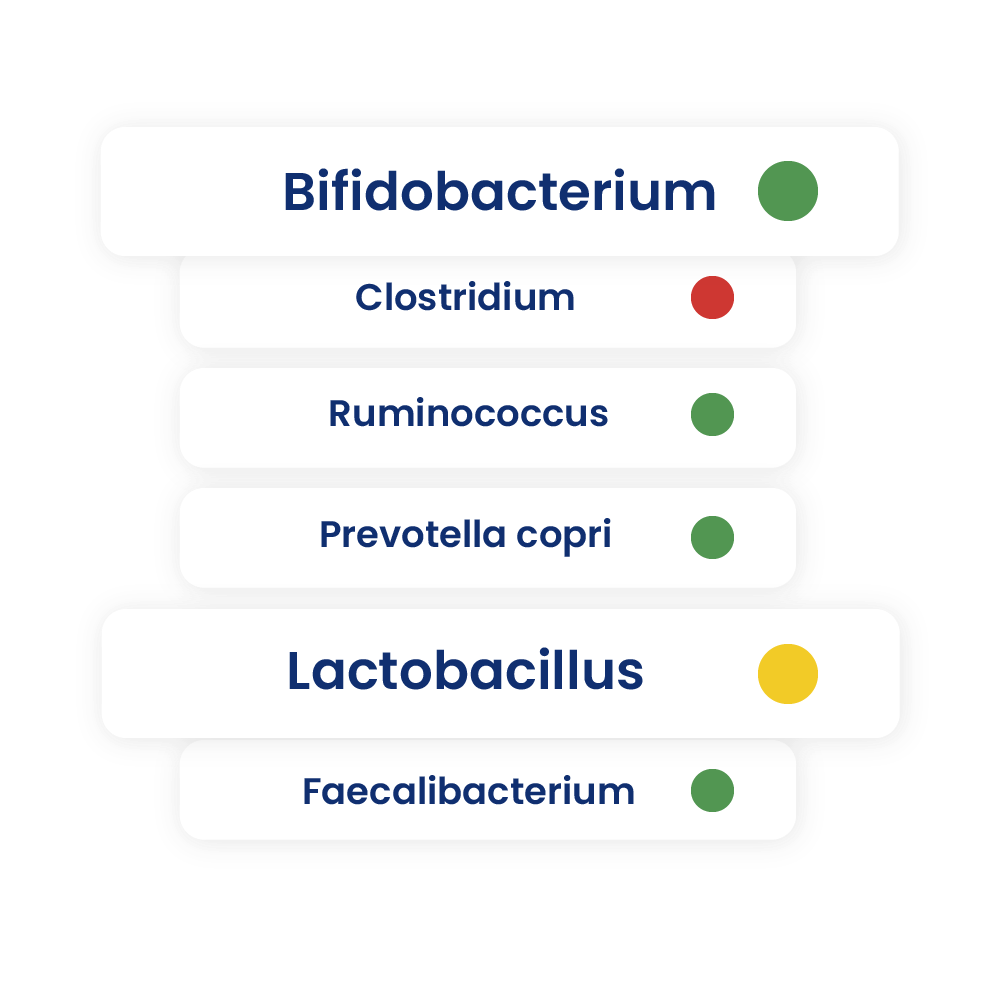What is the gut?
The gastrointestinal (GI) tract, or gut, is a crucial part of the digestive system. We tend to refer to the “gut” as being singular, whereas in reality it is a complex pathway in our body consisting of the mouth, oesophagus, stomach, small intestine (split into the duodenum, jejunum and ileum), large intestine, and ends at the rectum and anus.
The gut is responsible for several bodily functions; it helps to digest and process food and liquids, it extracts vital nutrients and helps to excrete waste products that our body does not need; however, it’s importance to our body expands much further than once thought.
The gut was primarily seen only as the body’s digestive system, but exciting new research shows that the gut is vital to our overall health and may even help to regulate our immune and nervous systems. Whilst we are still learning exactly how the gut impacts our wider health, what we do know is that the gut microbiome is at the forefront of our overall health and wellness and assists with many of our bodily functions.
The gut microbiome
The gut microbiome consists of trillions of microorganisms, including diverse types of bacteria, fungi, viruses, and parasites, all residing in the gastrointestinal tract.
Everyone’s microbiome is completely unique to them, it is influenced by things such as genetics, lifestyle, diet, age, environment, and even whether we were born vaginally or via C-section. The microbiome is so unique to an individual, that even a pair of identical twins can have a vastly different microbiome profile.
These microorganisms contribute to the body's metabolic functions, protect against pathogens, support the immune system, and, through the gut-brain axis, may even impact mental health.
Not all the microorganisms within our gut are beneficial, however; in fact, there can be some that can be harmful to our health and cause disturbances. Maintaining a diverse mixture of healthy microorganisms can help to reduce the number of harmful microbes. We touch on how to improve your gut health further in this guide.
What does the gut microbiome do?
Assists with digestive function:
The gut microbiome assists in digesting and breaking down food components that human enzymes cannot digest, particularly complex carbohydrates and fibres, leading to the production of short-chain fatty acids that nourish the gut lining and help provide anti-inflammatory properties to our immune system.
The gut microbiome is also responsible for synthesising vitamins and helping the body to absorb minerals.
Helps to strengthen immunity:
The gut contains over 70% of your body's immune cells. Beneficial microbes regulate immune responses, while SCFAs help prevent inflammatory diseases, including various autoimmune disorders.
Improves metabolic health:
As soon as we consume food, our body instantly gets to work in turning that food into energy. Our gut microbiota can help to produce hormones that regulate your metabolism.
Altered gut microbiota has been linked to metabolic and immune disorders. It influences the body's metabolism, affecting energy balance and storage, and may play a role in managing blood sugar levels and influencing the risk of metabolic disorders like obesity and diabetes.
Influences our mental health:
As strange as it sounds, our gut and our brain are intricately linked together by what we call the gut-brain axis, which is essentially a bi-directional communication pathway that allows them both to communicate to each other. The gut-brain axis may regulate our mood, energy levels, anxiety levels, and may also influence our sleeping patterns.
When we experience an imbalance in our gut (known as gut dysbiosis), the messages being sent via the gut-brain axis may be disrupted, and may therefore affect our mood, energy, anxiety and sleeping patterns.
Protects against chronic diseases:
An imbalance in the microbiome (gut dysbiosis) has been linked to a higher risk of chronic diseases, while a well-balanced microbiome can help prevent and protect against these conditions.
Why is gut health important?
Gut health is fundamental to maintaining our overall physical and mental wellness. A healthy gut contributes to improved immunity, efficient nutrient absorption, improved cognitive and brain function, and emotional well-being. It also plays a critical role in preventing gastrointestinal symptoms such as acid reflux, diarrhoea, constipation, bloating, fatigue and more.
Maintaining a healthy gut not only helps to prevent digestive symptoms but may also be effective at tackling the root cause of many chronic diseases including heart disease, diabetes, and autoimmune disorders.
Bacteria in the gut
Gut bacteria is typically placed into two distinct categories; beneficial and potentially harmful. Bacteria such as Lactobacillus and Bifidobacterium are known for being beneficial to our overall health and may influence our digestion, can produce vitamins which can reduce our risk of deficiency, and may even aide our immunity and bone health.
Beneficial gut bacteria like Bifidobacterium and Lactobacillus also help to inhibit the growth of potentially harmful bacteria that can lead to several chronic conditions such as IBS (irritable bowel syndrome) and increase your risk of chronic disease including cardiovascular disease and arthritis.
Whilst maintaining a healthy balance of good and bad bacteria is essential to our health, it’s not possible to ensure that our gut is made up of just beneficial bacteria. In fact, some of the harmful bacteria are essential in keeping our good bacteria on their toes so they can learn how to suppress harmful bacteria when they appear.
Learn more about gut bacteria and why it is important to our health.
Gut dysbiosis
It is possible that some individuals may experience an imbalance in their gut bacteria, known as gut dysbiosis. Lifestyle, diet, genetics, age, and environment all play a part in the development of gut dysbiosis.
Gut dysbiosis occurs when there is a lack of diversity of bacteria within the gut, or when there is an overgrowth of “bad” bacteria. Gut dysbiosis will typically cause several symptoms; most commonly digestive symptoms such as bloating, constipation, diarrhoea, and fatigue, but it can also increase your risk of developing many chronic conditions.
Our guide covers gut dysbiosis, causes, symptoms and how to fix it in more detail.
What are the symptoms of an unhealthy gut?
Poor gut health may cause the following symptoms. :
- Digestive symptoms: Bloating, gas, diarrhoea, constipation, and heartburn.
- Changes to your mental health: Persistent/chronic fatigue, sleep disturbances, anxiety, and depression are often linked to gut health issues due to the gut-brain axis that is disturbed.
- Physical symptoms: Weight fluctuations, eczema or other gut-skin related conditions.
- Food Intolerance: An increase in food sensitivities or intolerances. Learn more about food intolerance symptoms, causes and treatments in our guide.
How can I improve my gut health?
The good news is that there are everyday things we can do to improve our gut health, here are some of our tips.
Microbiome friendly balanced diet
A balanced diet should include a variety of whole foods rich in fibre, such as fruits, vegetables, whole grains, and legumes, to nourish beneficial gut bacteria. Incorporating fermented foods like yogurt and kefir can introduce beneficial gut bacteria. It is important to minimise the intake of processed foods and foods high in sugar that can promote harmful bacterial growth.
A gut microbiome test kit can provide you with a microbiome friendly diet by matching foods to your microbiome profile.
Regular exercise:
Physical activity can improve gut bacteria diversity and overall health and mental well-being. Physical activity is also clinically proven to boost energy levels.
Adequate sleep:
A good night's sleep should be prioritised and scheduled into your day. Adequate sleep can improve your overall physical, mental, and gut health in the long term.
Stress management:
Implement stress-reducing practices like mindfulness, meditation, or yoga. Chronic stress can disrupt gut balance and lead to increased fatigue.
Work-life balance:
Ensure adequate downtime and breaks during work to prevent burnout and reduce the stress that can contribute to gut dysbiosis.
Hydration:
Maintain hydration, as water is essential for digestive health and overall bodily function. Try having a glass of water as soon as you wake up, it will ensure you are starting your day fully hydrated.
How can I test my gut health?
Gut Microbiome Test
A gut microbiome stool test evaluates the composition, diversity, and function of the gut microbiome, and can detect imbalances, infections, or inflammation. A gut microbiome health test can provide you with a complete picture of your gut health and identify how to improve your gut health.
Breath Tests:
Measure the production of gases like hydrogen and methane, which can indicate conditions such as small intestinal bacterial overgrowth (SIBO).
Blood Tests:
Can identify markers of inflammation or nutrient absorption issues, suggesting potential gut health problems.





